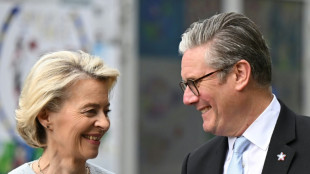

$TRUMP dinner blurs lines between profit and politics
More than two hundred guests on Thursday will make their way to a ritzy country club just up the Potomac River from Washington, ready for a sumptuous dinner hosted by the president of the United States.
The lucky few are not top officials or visiting heads of state but the 220 biggest buyers of $TRUMP, a crypto memecoin launched by the US president in January.
The top 25 investors will enjoy even more special access: a private session with Trump before dinner -- which is set at the Trump National Golf Club in Potomac Falls, Virginia -- and a White House tour.
"The most EXCLUSIVE INVITATION in the World," a website dedicated to the event said. "The question is...ARE YOU IN?"
This dinner represents perhaps the boldest commercial venture of Trump's presidency, further blurring already hazy boundaries between politics and profit.
Launched hours before his January inauguration, the $TRUMP memecoin is only one example of the Trump family's ever-expanding moves into cryptocurrency.
Much of the crypto industry frowns upon these coins or tokens, fearing they tarnish the sector's credibility, amid reports of quick pump-and-dump schemes that leave unwitting buyers paying for assets that end up worthless.
$TRUMP saw a spike in value when it announced the dinner, but reports said that many of the winners of the offer, which closed on May 12, are now selling their memecoins.
Critics, including the typically Trump-friendly Wall Street Journal editorial board, point out that Trump and his allies, as the creators of the memecoin, have made $320 million in trading fees, citing Chainalysis, a data analytic firm.
They also point out that the dinner allows foreign actors who otherwise can't influence the White House to try to use the memecoin to buy favor with the government.
The crypto industry, which massively contributed to his campaign, has welcomed Trump's return to the White House, praising his promise for a clear departure from the skepticism of the previous Democratic administration toward digital currencies.
Those years were marked by major scandal, including the collapse of FTX, the crypto giant founded by CEO Sam Bankman-Fried, who is now serving a 25-year sentence for committing massive fraud.
But the controversy surrounding the dinner is complicating efforts to pass crucial legislation that would provide clearer legal framework in stablecoins, digital assets that are considered safer and more established than more speculative corners of the sector.
"The American people deserve the unwavering assurance that access to the presidency is not being offered for sale to the highest bidder in exchange for the President's own financial gain," US Senators Adam Schiff and Elizabeth Warren wrote in a letter to the Office of Government Ethics.
Trump, despite previous hostility toward cryptocurrency, has already taken significant steps to reduce regulatory barriers, including an executive order establishing a "Strategic Bitcoin Reserve" that would maintain government holdings of the world's leading digital currency.
However, key Democrats in Congress are blocking other legislative advancements, frustrated by the dinner and other Trump family ventures into cryptocurrency.
- Win the 'race' -
These expanding connections include investment in Binance, whose founder is seeking a presidential pardon to re-enter the US market.
The investment is being made through World Liberty Financial, a cryptocurrency venture backed by the Trumps that launched in September and has made major deals in the Middle East.
The company founders feature Trump's sons Donald Jr. and Eric alongside Zach Witkoff, son of Trump's diplomatic adviser Steve Witkoff.
At an April crypto conference in Dubai, Eric Trump and Zach Witkoff announced that the state-backed Emirati fund MGX would use USD1, their firm's cryptocurrency, to invest $2 billion in Binance.
Additionally, American Bitcoin, another venture backed by Trump's eldest sons, recently announced plans to list on the New York Stock Exchange.
That company will ride lower energy costs and environmental norms to lower the cost of bitcoin mining in the United States.
"The US won the space race. We better win the crypto race," Eric Trump recently told CNBC.
C.Reiter--SbgTB



